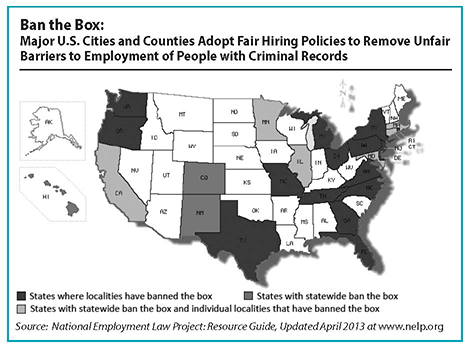Not hiring individuals just because they said yes to a question on your organization’s employment application about whether they have ever been convicted of a crime, or because a background check indicates some kind of criminal record, could get your laboratory in trouble with the Equal Employment Opportunity Commission (EEOC).
While performing criminal background checks on prospective employees may be a reasonable component of your hiring practices, if it results in a disparate impact on the basis of race, color, religion, sex, or national origin you may be violating the Civil Rights Act of 1964. An Aug. 9 memorandum opinion issued by the U.S. District Court of Maryland implies that an employer, such as a laboratory, must make certain that its hiring policies and the use of background checks incorporate safeguards that allow additional investigation if an otherwise qualified applicant has some kind of criminal record or credit history problem. In other words, don’t automatically reject an applicant who has checked that box on your application that says “Have you ever been convicted of a crime?”
The Maryland case was filed by the EEOC and is based on the theory that there is a disparate impact criminal background and credit history checks have on African American and male applicants. The defendant, Freeman, is a company that provides integrated services for expositions, conventions, corporate events, meetings, and exhibit programs. The EEOC claimed that Freeman implemented a hiring policy that appears neutral but resulted in a discriminatory effect. Ultimately, the EEOC lost the case primarily because the defendant had detailed policies that allowed for consideration of any findings on criminal background records and had clearly stated criteria for credit checks, and because the EEOC could not provide reliable and timely evidence that Freeman’s hiring practices actually resulted in a disparate impact against any class of applicants. It is important to note that this case started with a single complaint by an applicant filed on Jan. 17, 2008.
Freeman did everything it was required to do including providing a reason for performing the background checks, limiting the checks to only those jobs where the checks were relevant to the job, and giving applicants an opportunity to explain any findings. It even went so far as to include the following statement on its application where the box asking about criminal convictions was located: “A conviction does not automatically mean you will not be offered a job. What you were convicted of, the circumstances surrounding the conviction and how long ago the conviction occurred are important considerations in determining your eligibility. Give all the facts, so that a fair decision can be made.” Applicants were also required to sign an authorization for Freeman to conduct the background screens, which were done after a job offer was made but before the applicant began work.
According to a recent National Employment Law Project report, an estimated 65 million people, one in four adults, have a criminal record that may show up on a criminal background check. This criminal record creates challenges for applicants in their efforts to get a job, even when the item is old or unrelated to the job being sought.
Many cities and states around the country have implemented policies to remove the box on an employer’s application form that asks about a criminal record, hence the term “ban the box.” In all, 50 municipalities and some states have implemented some kind of policy to promote fair hiring policies and eliminate barriers to employment of people with criminal records. Some of the more prominent cities include Chicago; Jacksonville, Fla.; Philadelphia; San Francisco; Memphis, Tenn.; and Baltimore.
Best Practices
To avoid a potential human resources nightmare, labs should take some steps to ensure their hiring practices do not result in a complaint to the EEOC, or if one occurs, be certain they can defend their hiring practices. First, don’t reject applicants simply because they check that box on your application or because they have some kind of criminal record in their past. Second, have detailed polices and procedures related to background checks that have been vetted by legal counsel familiar with both federal and state labor and discrimination law. Third, limit background checks either by length of time since the criminal act occurred or by relevancy to the job for which the person is applying. For instance, only perform credit history checks on applicants applying for jobs with money or financial responsibilities.
Fourth, give an applicant an opportunity to explain the circumstances surrounding a criminal conviction and document the discussion clearly in the employee record. Fifth, don’t let the fear of a possible EEOC complaint deter you from doing these kinds of employee screens and background checks. There are liabilities of equal significance if you hire someone with a criminal background and they commit the same or a similar act while in your employ.
Takeaway: Criminal background checks and credit screenings are important tools to ensure a workforce that does not create problems for your laboratory, but you must do them with appropriate sensitivity to avoid complaints of discrimination.
Associated Data

